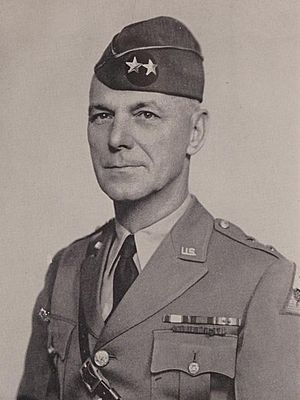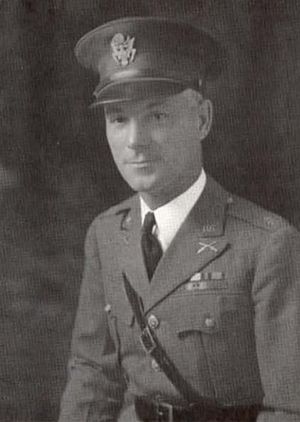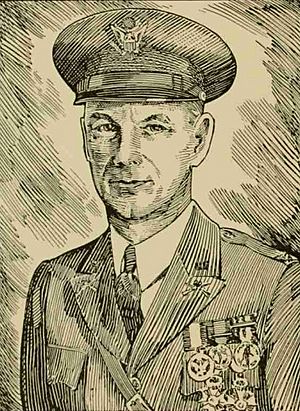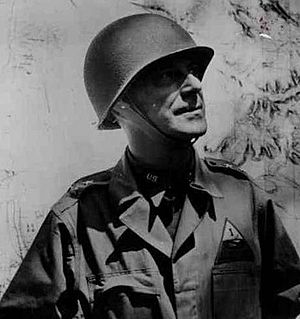Bruce Magruder facts for kids
Quick facts for kids
Bruce Magruder
|
|
|---|---|

From 1941's Historical and Pictorial Review: First Armored Division of the United States Army
|
|
| Born | December 3, 1882 Washington, D.C. |
| Died | July 23, 1953 (aged 70) Orlando, Florida |
| Buried | |
| Allegiance | United States |
| Service/ |
United States Army |
| Years of service | 1904-1946 |
| Rank | Major General |
| Unit | U.S. Army Infantry Branch |
| Commands held | 1st Battalion, 62nd Coast Artillery Regiment Reserve Officers' Training Corps, North Carolina Agricultural and Technical College 66th Armor Regiment Washington Provisional Brigade 7th Provisional Tank Brigade 1st Armored Division Infantry Replacement Training Center, Camp Wolters, Texas |
| Battles/wars | Moro Rebellion Pancho Villa Expedition World War I World War II |
| Awards | Army Distinguished Service Medal Legion of Merit French Legion of Honor (Chevalier) Belgian Order of the Crown |
| Spouse(s) | Clara Ferol Lott (m. 1912-div. c. 1930) Ethel (Marshall) Stevenson (m. 1935-1953, his death) |
| Children | 2 |
Bruce Magruder (December 3, 1882 – July 23, 1953) was an important officer in the United States Army. He served in many conflicts, including the Moro Rebellion, the Pancho Villa Expedition, World War I, and World War II. He rose to the rank of major general.
Magruder is best known for two big roles. He was the first commander of the famous 1st Armored Division. He also led the Infantry Replacement Center at Camp Wolters, Texas, during World War II. This center trained many soldiers for the war.
Contents
Early Life and First Steps in the Army
Bruce Magruder was born in Washington, D.C. on December 3, 1882. He went to public schools in Washington and finished Central High School in 1903. From a young age, he wanted a military career.
In high school, he was a first lieutenant and captain in his school's cadet corps. He even commanded them during events like President William McKinley's inauguration in 1901. He also joined the District of Columbia National Guard as a first lieutenant.
Magruder studied at Maryland Agricultural College and George Washington University. In 1904, he joined the United States Army as a private. He served for three years and became a sergeant.
Becoming an Officer
In 1907, Bruce Magruder passed a tough test to become an officer. He was made a second lieutenant in the Infantry. His first assignment was in the Philippines. There, he helped during the Moro Rebellion, which was an effort by the U.S. to stop an uprising.
After returning to the U.S., he served in Fort Mackenzie, Wyoming. He became a first lieutenant in 1911. From 1912 to 1913, he worked as an aide-de-camp for Brigadier General Frederick Appleton Smith. He went back to the Philippines in 1913. In 1916, he was promoted to captain.
Service in World War I
In November 1917, Magruder became a temporary major. He worked in the Intelligence Section (G-2) at the headquarters of the American Expeditionary Forces in France. This group helped gather important information during the war.
He was promoted to temporary lieutenant colonel in November 1918. For his excellent work, he received the Army Distinguished Service Medal. He also earned awards from France (the Legion of Honor) and Belgium (the Order of the Crown).
After World War I
After World War I, Magruder returned to the U.S. in 1919. He continued to work in intelligence for the Army. In 1920, he returned to his permanent rank of major. He attended advanced military courses and graduated with honors from the United States Army Command and General Staff College in 1926.
He later became an instructor for Army Reserve officers. From 1931 to 1936, Magruder led the Reserve Officers' Training Corps (ROTC) program at North Carolina College of Agricultural and Mechanic Arts. He was promoted to colonel in 1935.
From 1936 to 1937, Magruder commanded the 66th Armor Regiment in Maryland. This unit was one of the first to get light tanks. One of these tanks was even named after him! From 1937 to 1940, he worked at the Infantry Center and School in Georgia. He became a brigadier general in 1939.
World War II Leadership
As the U.S. Army prepared for World War II, Magruder played a big role. He led the 7th Provisional Tank Brigade, which tested new tank fighting methods. He and other leaders, like George S. Patton, believed the U.S. needed a strong armored force.
In July 1940, Magruder was chosen to be the first commander of the 1st Armored Division. This was a very important job. He organized and equipped this new division. He also helped create its famous nickname, "Old Ironsides." He was promoted to Major General in October 1940. His division helped train soldiers for other new armored divisions.
In March 1942, Magruder took on a new role. He became the commander of the Infantry Replacement Training Center (IRTC) at Camp Wolters, Texas. This center was vital for training new soldiers. These soldiers were sent to fight in Europe and the Pacific. Magruder stayed in this role until the war ended in 1945.
For his great service, he received the Legion of Merit award. He retired from the Army on May 31, 1946.
Later Life and Family
After retiring, Bruce Magruder lived in Biloxi, Mississippi, and later in Winter Park, Florida. He passed away on July 23, 1953, in Orlando. He was buried at Arlington National Cemetery.
Magruder married Clara Ferol Lott in 1912. They had two sons, Bruce Jr. and William. Both of his sons also served in the military. Bruce Jr. was an officer in the United States Marine Corps, and William was an officer in the United States Air Force.
Interestingly, Bruce Magruder was also related to George Washington. He was a great-great-great-grand nephew of the first U.S. president.
Images for kids
 | Jackie Robinson |
 | Jack Johnson |
 | Althea Gibson |
 | Arthur Ashe |
 | Muhammad Ali |





